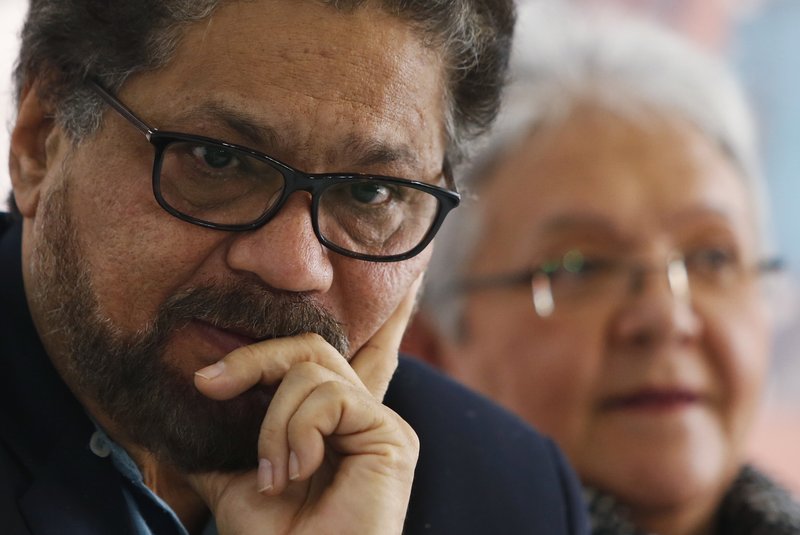BOGOTA, Colombia -- Venezuela on Friday expressed concern over "the imminent reactivation of armed conflict" in Colombia and rejected accusations by Bogota that it was protecting a Colombian armed group.
Foreign Minister Jorge Arreaza read out the statement one day after the former chief negotiator for the Revolutionary Armed Forces of Colombia announced he would resume fighting. Luciano Marin alleged that the government has failed to uphold a 2016 peace accord and accused it of standing by as hundreds of social leaders have been slain in rural areas where the rebels long dominated.
Marin read a manifesto in a video surrounded by a cadre of 20 armed rebels from what he said was a clandestine camp in Colombia's eastern jungles but which authorities contend was in Venezuela -- long a safe haven for the rebels.
Almost immediately, President Ivan Duque reached out to Venezuelan opposition leader Juan Guaido, whose nine-month campaign to unseat President Nicolas Maduro has stalled amid the refusal of Venezuela's military to abandon the embattled leader. For both men, the video was further proof that the rebels, which are designated a terrorist group by the U.S., are plotting attacks from Venezuelan soil.
"We're not witnessing the birth of a new guerrilla army, but rather the criminal threats of a band of narco-terrorists who have the protection and support of Nicolas Maduro's dictatorship," Duque said in a televised address.
Guaido added: "All Venezuelans should reject these types of threats that undermine our sovereignty."
Arreaza rejected the accusations Friday, turning instead on Duque, whose intransigence he blamed for leading the rebels to abandon the peace process.
"His attitude not only puts at risk the normalization of life in Colombia but also threatens the peace and security of South America," Arreaza said.
Duque's concerns were echoed in Washington, where U.S. officials reiterated accusations that Maduro's government has been actively conspiring with Colombian rebels, especially the more radical National Liberation Army which is believed to fund its insurgency by smuggling cocaine and gold through Venezuela.
"The regime in Caracas seems to be fomenting this kind of activity, in essence turning over parts of the country, particularly to the [National Liberation Army]," Elliott Abrams, the White House's special envoy to Venezuela, told reporters.
Colombian authorities have long asserted that Marin has been hiding out in Venezuela along with other top rebel commanders from the National Liberation Army and a group of dissident Revolutionary Armed Forces rebels that never handed over their weapons.
Overall, authorities estimate as many as 1,000 National Liberation Army rebels -- or about 40% of the group's fighting force -- operate from Venezuela, where they plan attacks like the January car bombing at a Bogota police academy that killed more than 20 cadets.
Maduro and his allies have long denied they are providing material support to Colombian rebels, and portray the U.S. claims part of a Western media-hyped campaign to pave the way for an invasion.
A decadelong, U.S.-funded military buildup in Colombia forced the Revolutionary Armed Forces to the negotiating table in 2012. Intelligence officials have long maintained that the rebels are unable to concentrate in large numbers inside Colombia for fear of being killed like a string of previous commanders who were killed in airstrikes using U.S.-provided intelligence and smart bombs.
As if to underscore that point, authorities announced Friday that nine guerrillas belonging to a Revolutionary Armed Forces faction that never demobilized were killed in an aerial raid. Few details of the operation were released, but Duque said the dead included a rebel known by his alias, Gildardo Cucho, who was among those Marin was looking to recruit to his new rebel movement.
"We're putting the criminals on notice: either they surrender or they will be vanquished," Defense Minister Guillermo Botero said on Twitter.
That leaves socialist-ruled Venezuela, whose ideological affinity with the rebels is well known.
While Maduro played a key role in brokering the 2016 peace accord, he has increasingly flouted calls to banish the rebels as tensions with the U.S. and his neighbors have mounted. Last month, he even went so far as to announce that Marin and a close ally, Seuxis Hernandez, wanted by the U.S. on drug charges, would be "welcome in Venezuela" as "leaders of peace." Hernandez was seen in Thursday's video standing next to Marin holding an assault rifle.
Since the outset of Venezuela's crisis, when Guaido in January declared himself interim president and quickly won recognition from dozens of foreign governments, the U.S. has been leaning on allied Colombia to lead the campaign against Maduro. But while U.S. officials have repeatedly floated a military option to remove Maduro, Duque has steadfastly rejected the idea, fearing it could get Colombia mired in a prolonged conflict that would have scant regional support.
Information for this article was contributed by Sinikka Tarvainen of Deutsche Presse-Agentur.
A Section on 08/31/2019
